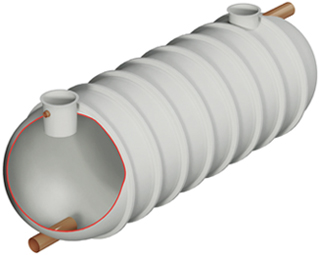Some properties have septic tanks and others can have sewage treatment plants in place to break down and efficiently remove waste from the premises and dispose of it safely and responsibly. But for many, it can be hard to differentiate between the two systems as they primarily have the same functionality.
So we’ve made a list of the obvious differences between septic tanks and sewage treatment plants, so that you will have more of an informed overview as to how they function as well as any special requirements that you need to be aware of before you make the decision as to which waste removal solution is the best one for you.
Septic tank
- It uses a natural biological process to breakdown the waste.
- Receives untreated wastewater from a property and allows the heavier solids to settle at the bottom of the tank while the effluent rises to the top.
- It uses self-forming bacteria to help the system break down the solids into sludge.
- The effluent still contains 70% of the polluted matter so further treatment is required before it can be discharged.
- The remaining liquid then flows out of the tank into a drainage field.
- Does not require electricity.
- Does not require servicing.
- Needs to be emptied at least once a year.
Sewage treatment plant
- This system involves rotating media discs that are designed to create aerobic
bacterial digestion of the waste, treating to a much higher standard than the
septic tank. - The effluent has the appearance of clear water and is 95% clean (compared to 70% by a septic tank) and is therefore non-polluting so can be discharged straight into a watercourse or ditch – as long as it is approved by the Environment agency – to soak away.
- Does require electricity – the amount varies from plant to plant.
- Needs to be registered with the Environment Agency (EA) as they may require a permit.
- Does need to be serviced.
- Only needs emptying between 3-60 months, depending on the type of plant you have.
After looking into what each waste system has to offer, it is clear that the septic tank provides a simple way to treat and dispose of raw waste whereas the sewage treatment plant is capable of offering a more efficient waste disposal producing a less polluting effluent that requires no further treatment.
Whether it’s waste treatment for domestic or commercial properties, Wildon UK can create a tailored sewage treatment that works efficiently to a high standard. Simply give us a call to find out more about our septic tanks and sewage treatment plant installations.
Go back to








